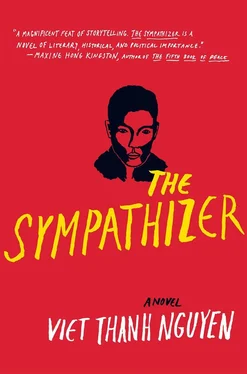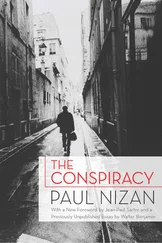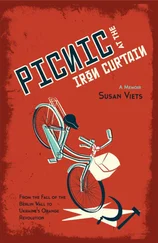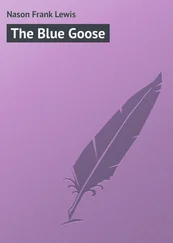Perhaps they are, I said, pretending to be embarrassed. I gave him my pack of cigarettes to divert him and returned to my barracks to report the gist of our conversation to my aunt, minus the uninteresting parts about my fear, trembling, sweating, etc. Fortunately, we were not much longer for the camp, where little existed to alleviate the General’s rage. Shortly after arriving in San Diego, I had written to my former professor, Avery Wright Hammer, seeking his help in leaving the camp. He was Claude’s college roommate and the person Claude had told about a promising young Vietnamese student who needed a scholarship to come study in America. Not only did Professor Hammer find that scholarship for me, he also became my most important teacher after Claude and Man. It was the professor who had guided my American studies and who had agreed to venture out of his field to supervise my senior thesis, “Myth and Symbol in the Literature of Graham Greene.” Now that good man leaped to action once again on my behalf, volunteering to be my sponsor and, by the middle of the summer, arranging a clerical position for me in the Department of Oriental Studies. He even took up a collection on my behalf among my former teachers, a grand gesture that moved me deeply. That sum, I wrote to my aunt at summer’s end, paid for my bus ticket to Los Angeles, a few nights in a motel, the deposit on an apartment near Chinatown, and a used ’64 Ford. Once situated, I canvassed my neighborhood churches for anyone who would sponsor Bon, religious and charitable organizations having proven sympathetic to the refugee plight. I came across the Everlasting Church of Prophets, which, despite its impressive name, plied its spiritual wares out of a humble storefront flanked by a bottom-feeding auto body shop and a vacant blacktop lot inhabited by heroin zealots. With minimal persuasion and a modest cash donation, the rotund Reverend Ramon, or R-r-r-r-amon as he introduced himself, agreed to be Bon’s sponsor and nominal employer. By September and just in time for the academic year, Bon and I were reunited in genteel poverty in our apartment. Then, with what remained of my sponsor’s money, I went to a downtown pawnshop and bought the last of life’s necessities, a radio and a television.
As for the General and Madame, they, too, ended up in Los Angeles, sponsored by the sister-in-law of an American colonel who had once been the General’s adviser. Instead of a villa, they rented a bungalow in a slightly less tony part of Los Angeles, the city’s flabby midriff, Hollywood adjacent. Every time I dropped by for the next several months, as I wrote to my aunt, I found him still mired in a profound funk. He was unemployed and no longer a general, although his former officers all hailed him as such. During our visits, he consumed an embarrassingly varied assortment of cheap beer and wine, vacillating between fury and melancholy as one might imagine Richard Nixon to be doing not far away. Sometimes he choked on his emotions so badly I feared I would have to perform the Heimlich maneuver on him. It was not that there was nothing for him to do with his time. It was that Madame was the one who found schools for the children, wrote the rent check, shopped for groceries, cooked the meals, washed the dishes, cleaned the bathrooms, found a church — in short, undertook all the menial tasks of household drudgery that, for her entire cocooned existence, someone else had managed. She attended to these tasks with a grim grace, in short order becoming the house’s resident dictator, the General merely a figurehead who occasionally bellowed at his children like one of those dusty lions in the zoo undergoing a midlife crisis. They lived in this fashion for most of the year before the credit line of her patience finally reached its limit. I was not privy to the conversations they must have had, but one day at the beginning of April I received an invitation to the grand opening of his new business on Hollywood Boulevard, a liquor store whose existence in the Cyclopean eye of the IRS meant that the General had finally conceded to a basic tenet of the American Dream. Not only must he make a living, he must also pay for it, as I myself was already doing as the dour face of the Department of Oriental Studies.
My job was to serve as the first line of defense against students who sought audiences with the secretary or the Department Chair, some addressing me by name though we had never met. I was a moderate celebrity on campus because of the feature the student newspaper had run on me, a graduate of the college, member of the dean’s list and honor roll, sole Vietnamese student in the history of my alma mater, and now rescued refugee. The article also mentioned my soldiering experience, although it was not quite accurate. What did you do? the budding journalist had asked. He was a skittish sophomore with braces on his teeth and teeth marks on his yellow no. 2 pencil. I was a quartermaster, I said. A boring job. Tracking supplies and rations, making sure the troops had uniforms and boots. So you never killed anyone? Never. And that, indeed, was the truth, even if the rest of my interview was not. A college campus was a bad place to acknowledge my service record. First, I was an infantry officer in the Army of the Republic of Vietnam, where I had begun serving the General when he was a colonel. Then, when he became a general and took charge of the National Police, which was in need of some military discipline, I, too, moved with him. To say that one saw combat, much less was involved with the Special Branch, was a delicate topic on most college campuses even now. The campus had not been exempt from the antiwar fervor that had blazed like a religious revival through collegiate life when I was a student. On many college campuses including my own, Ho Ho Ho was not the signature call of Santa Claus, but was instead the beginning of a popular chant that went Ho Ho Ho Chi Minh, the NLF is gonna win! I envied the students their naked political passion, for I had to submerge my own in order to play the role of a good citizen from the Republic of Vietnam. By the time I returned to campus, however, the students were of a new breed, not interested in politics or the world like the previous generation. Their tender eyes were no longer exposed daily to stories and pictures of atrocity and terror for which they might have felt responsible, given that they were citizens of a democracy destroying another country in order to save it. Most important, their lives were no longer at stake because of the draft. The campus had, as a result, returned to its peaceful and quiet nature, its optimistic disposition marred only by the occasional spring shower thrumming on my office window. My hodgepodge of tasks, for which I was paid minimum wage, involved answering the phone, typing professorial manuscripts, filing documents, and fetching books, as well as helping the secretary, Ms. Sofia Mori of the rhinestoned, horn-rimmed glasses. These things, perfectly suitable for a student, amounted to death by a thousand paper cuts for me. To compound matters, Ms. Mori did not seem to like me.
It’s nice to know you never killed anybody, she said not long after we met. Her sympathies were obvious, a peace symbol dangling from her key chain. Not for the first time, I longed to tell someone that I was one of them, a sympathizer with the Left, a revolutionary fighting for peace, equality, democracy, freedom, and independence, all the noble things my people had died for and I had hid for. But if you had killed someone, she said, you wouldn’t tell anybody, would you?
Would you, Ms. Mori?
I don’t know. She swiveled her chair with a twist of her womanly hips, turning her back to me. My small desk was tucked into a corner, and from here I shuffled papers and notes in a pretense of labor, the tasks not enough to fill my eight-hour days. As expected, I had smiled dutifully at my desk when the student journalist photographed me, aware I would be on the front page, yellow teeth appearing white in the black-and-white photograph. I was doing my best imitation of a Third World child on one of those milk cartons passed around elementary schools for American children to deposit their pennies and dimes in order to help poor Alejandro, Abdullah, or Ah Sing have a hot lunch and an immunization. And I was thankful, truly! But I was also one of those unfortunate cases who could not help but wonder whether my need for American charity was due to my having first been the recipient of American aid. Fearful of being seen as an ingrate, I focused on making enough subtle noise to please but not distract Ms. Mori of the avocado-green polyester slacks, my pseudo-work interrupted periodically by the need to run errands or to come to the adjoining office of the Department Chair.
Читать дальше












